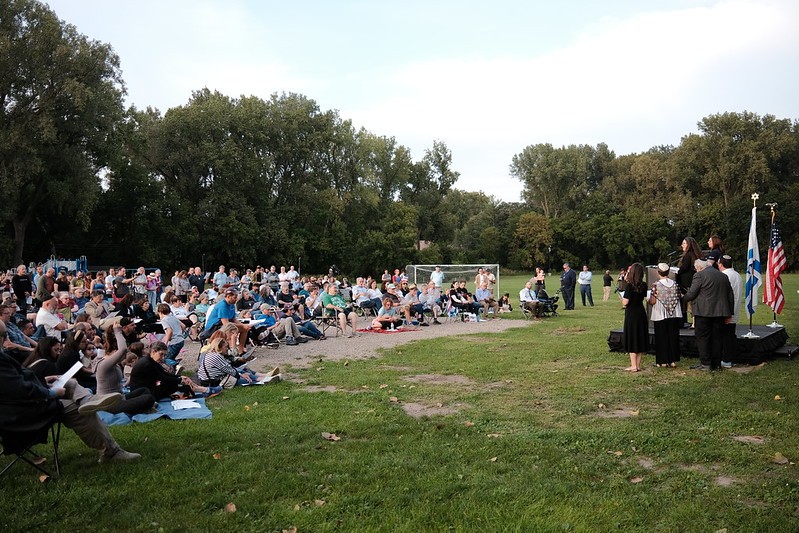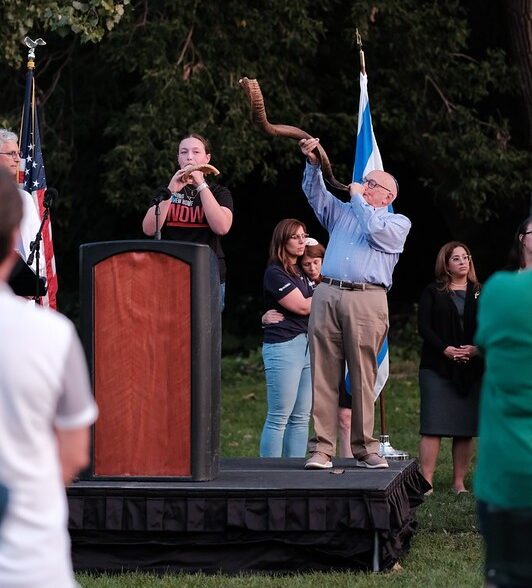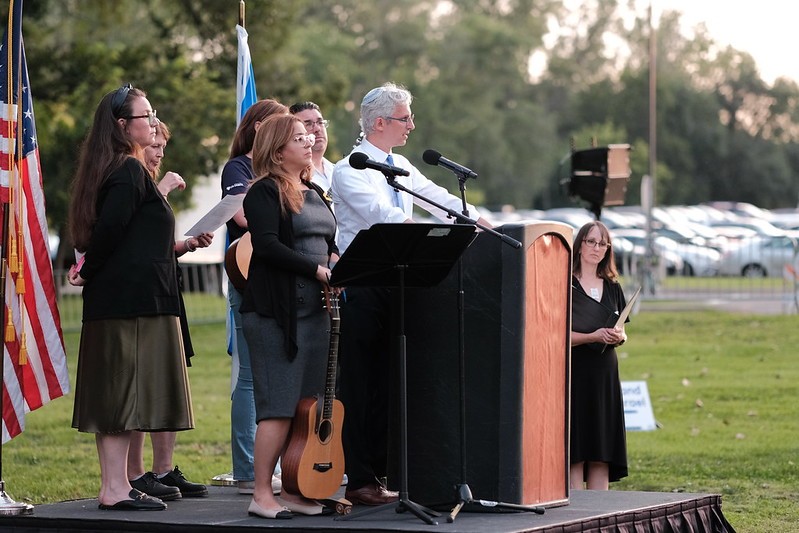A crowd of roughly 250 members and friends of the Twin Cities Jewish community – along with another 250 people who watched the livestream – gathered on the sports field at the Barry Family Campus on Wednesday night for a ceremony to mourn the six Israeli hostages murdered by Hamas last week.
“We prayed, and we protested, and petitioned, we wrote and we fought and searched and we believed,” said Rabbi Alexander Davis, senior rabbi at Beth El Synagogue.
“We held out hope [of bringing the hostages back home], indeed we were so close to finding them – finding them alive. But now we are left bereft,” he said. “God, we call to you from these narrow straits of grief and of heartache with pain so raw we feel a tightness in our chest. Answer us with compassion.”
On Sunday morning, the Israel Defense Forces announced that Hersh Goldberg-Polin, 23; Eden Yerushalmi, 24; Ori Danino, 25; Almog Sarusi, 27; Alexander Lobanov, 33; and Carmel Gat, 40, had been found shot to death in a Hamas tunnel in the southern Gaza city of Rafah.
Community leaders and clergy offered songs of mourning, and prayers for the remaining 97 hostages believed to be held by Hamas, of whom at least 33 have been confirmed dead by Israel.
Rabbi David Locketz, senior rabbi at Bet Shalom Congregation, referenced the words of the prophet Isaiah: “Comfort, comfort my people.” That’s the theme of many readings done at synagogues in the weeks after Tisha B’Av, the Jewish day of remembrance for historical disasters.
“This ancient call to comfort is simultaneously a call for action, and a beacon of hope amidst our mourning, for it offers a sacred promise: that even in our darkest hours, divine compassion and healing are near,” Locketz said. “May its message bring us the strength to heal, unite, and find peace in the face of our collective pain.”

A view of the assembled crowd (Lev Gringauz/TC Jewfolk)
The shofar was also blown in a ritual to mark the beginning of the Jewish month of Elul, the last month before the start of the high holidays in early October.
The one-year anniversary of Hamas’ Oct. 7 attack on Israel will take place between Rosh Hashanah, the Jewish New Year, and Yom Kippur, the day of atonement.
“May the cry of the shofar remind us that we can be instruments of redemption – redemption of the hostages,” said Steve Hunegs, executive director of the Jewish Community Relations Council of Minnesota and the Dakotas. “May the cry of the shofar bring blessings to us, the people who hear and heed its call.”
The Wednesday gathering, titled “When Words Are Not Enough,” was co-sponsored by the Minneapolis Jewish Federation, St. Paul Jewish Federation, Minnesota Rabbinical Association, Minnesota Cantorial Association, and TC Jewfolk.
“As Jews, we are a verbose people – we usually have no shortage of words,” Davis said.
“But sometimes in our grief and anguish, words are not enough, and sometimes when all we can do is cry, when our spirits are low, when our anger is so real, when our hope feels lost, there just are no words,” he said. “Beyond words, the shofar is our prayer, because the shofar gives voice to our heartbreak and our hopes, our fear and our faith.”
Autopsies show that the six hostages were murdered mere days before they were found on Sunday. Hersh Goldberg-Polin had been a prominent face of the movement to free the hostages, thanks to the tireless advocacy of his parents, Israeli-Americans Rachel Goldberg-Polin and Jon Polin.

Shofar blowers make the last sounds of the rally (Lev Gringauz/TC Jewfolk)
“Amidst the inexplicable agony, terror, anguish, desperation and fear, we became absolutely certain that you were coming home to us alive. But it was not to be,” Goldberg-Polin said at her son’s funeral.
“Sweet boy, go now on your journey,” she said. “I hope it’s as good as the trips you dreamed about, because finally, my sweet sweet boy, finally, finally, finally, finally you are free!”
Speakers at the Twin Cities gathering also eulogized Hersh Goldberg-Polin and the other hostages. In recent days, events all across the country have mourned the hostages, and the U.S. Department of Justice filed criminal charges against Hamas leaders.
“Perhaps you imagined in that moment what she had done for you the past 11 months,” said Rabbi Rachel Rubenstein, one of the co-rabbis at Temple of Aaron synagogue, about Hersh Goldberg-Polin and his mother, Rachel.
Rachel Goldberg-Polin had “not one full night of sleep, not one moment of rest…each word she uttered had her goal in mind: getting you home,” Rubenstein said.
“Can you see our posts, how much we all love you, how you have become a brother to us? Can you see our tears, our broken hearts, our despair?” she said. “We are forever changed by your beautiful soul, a soul which is now at peace while we are in agony. The shofar gives voice to our agony.”
The recovery of the hostage bodies has plunged Israel into further chaos, with hundreds of thousands of Israelis protesting over the last few days against Prime Minister Benjamin Netanyahu – accused by hostage families, the army, and security agencies alike of sabotaging hostage negotiations – and for a ceasefire deal with Hamas that would release more hostages.
Three of the six hostages murdered last week would likely have been released in the first part of the hostage deal currently under negotiation. Hamas has also rejected several proposed hostage deals.
The uprising marks the largest protests in Israel since the months-long rallies against Netanyahu and his judicial reform efforts that were a feature of the country before Oct. 7.
At the Twin Cities gathering, despite calls for the return of hostages and to stand with Israel, little specific was said of the upheaval against Netanyahu or the calls of many Israelis, including hostage families, to pressure the prime minister into a ceasefire and hostage deal.

Rabbi Alexander Davis speaks at the podium surrounded by cantors from across the Twin Cities (Lev Gringauz/TC Jewfolk)
Rabbi Davis came closest, alluding to the turmoil in Israel.
“We gather in anger and frustration, knowing that negotiations did not lead to the release of these six [hostages] in time today,” he said. Therefore, our hearts are shattered. Our spirits are crushed. Our patience is gone and our trust eroded.”
At the same time, “we must continue to pray and to protest, to write and to work, to fight and to search and never, never lose hope,” he said.
The rage of some Israelis and families of hostages, particularly against American Jews and Jewish institutions that don’t publicly advocate for a ceasefire and hostage deal, was on full display over the last few days.
A notable target has been the Anti-Defamation League, a leading American Jewish anti-hate and pro-Israel organization.
“You should be sorry. Even in Hersh’s death you cannot say what Rachel wanted, which was a deal,” said the Twitter account We Are All Hostages, representing some of the families of hostages, in response to ADL director Jonathan Greenblatt’s tweet memorializing Hersh Goldberg-Polin. “You have failed as a leader and should resign.”
In another tweet, Greenblatt mentioned Ofer Calderon, one of the hostages whose children, also taken hostage, were released in last year’s ceasefire and hostage deal.
“His family is leading the protests…against Netanyahu here in Israel,” replied Amir Tibon, an Israeli journalist who survived the Oct. 7 attack on Kibbutz Nahal Oz.
“The voice of your organization is non-existent on this issue. The way to save his father is to push for a deal, not to write how sad the situation is.”
Just eight Israeli hostages have been recovered alive from Gaza by IDF operations in the 11 months since the Israel-Hamas war started after Hamas’ brutal Oct. 7 attack. During the November ceasefire between Israel and Hamas, 105 hostages were brought home. Another four were released by Hamas early in the war.
Hamas initially took 251 hostages on Oct. 7, when it killed roughly 1,200 people in southern Israel, adding to four hostages already held by the Iran-backed terror group in Gaza.


















2 comments